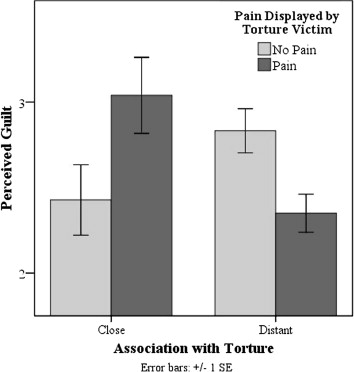Oh sweet man-made horrors within my comprehension!
Science
Welcome to Hexbear's science community!
Subscribe to see posts about research and scientific coverage of current events
No distasteful shitposting, pseudoscience, or COVID-19 misinformation.

study: people don't think critically and instead believe whatever is politically convenient as a coping mechanism for their atrocities
depressing but obvious
the study participants were randomly placed in the complicit or the uninvolved groups, presumably there wouldn't have been a major ideological difference between the groups. the two variables were the apparent pain of the actor and the participants' complicity in that pain. the complicit group was more sure of the actor's guilt when the actor expressed more pain, while the distant group was more sure of the actor's innocence when the actor expressed more pain.
The torture being studied was a hand in ice water, I don’t really understand how this is applicable. What did the distant participants who listened via audio hear? “Oh shit that’s cold water”. A university study would never get ethics board permission to actually give frostbite. Sits just a psych student who has to participate in at least one study in order to get study credit for the program.
It was explained to participants that although there was no way to tell if Carol had lied or had legitimately rolled an 8, people often admit to wrongdoing when placed in stressful situations. To that aim, Carol ostensibly did a cold pressor task after she reported the results of her die-roll, placing her hand in ice water for 80 s. Participants were told that they would listen to Carol being “tortured” and then judge the likelihood that she had cheated. Participants heard her react one of two ways to the cold pressor. In the pain condition, she appeared to feel significant discomfort, whimpering throughout the cold pressor. In the no pain condition, she appeared to feel little discomfort, reacting stoically to the cold.
After listening to the torture session, participants evaluated the likely guilt of the “torture victim” by answering three questions. The first two were, “How likely is it that the ‘torture victim’ had cheated?” and “How likely is it that the ‘torture victim’ is lying?” with responses made on a scale from 1 (“Not at all likely”) to 5 (“Extremely likely”). The third was “How moral or immoral do you perceive the ‘torture victim’ to be?” with responses made on a scale from 1 (“Extremely moral”) to 5 (“Extremely immoral”). As a manipulation check, participants also evaluated how much pain they perceived the “torture victim” to have felt on a scale from 1 (“No pain at all”) to 5 (“Extreme pain”).
CW: Abuse
This makes me wonder if patterns of abuse have a similar response. A lot of abuse victims adjust their behaviour to silence, seeking not to react and not to provoke their abuser. The less reaction the better.
I suspect that abusers also display similar patterns to these torturers, and abuse victims learn this behaviour unconsciously because it is the optimal way to reduce the severity of the abuse they receive.
Edit: how cold was the ice water? That’s deeply variable and 90 seconds is literally nothing
I may be focusing on how completely inconsequential the phsyicsl “torture” was. If the subject is a good actor they may have been able to effectively convince the subjects being tested on empathy. Maybe.
how cold was the ice water
they didn't actually do it, she was just acting, but presumably ice water would be just above 0°C
if you stuck someone's hand in ice water continuously for 80 seconds and they started to act like they were in pain and afraid, I think you might feel bad no matter what you told yourself logically.
Oh, that makes more sense.
I haven’t read the paper, but are they just counting the guy pulling teeth as torturers or also the DeSantis types that revel in watching and ordering others to do it? I feel like if you’re torturing somebody, you don’t really give a shit about truth or justice whereas the pencil pusher watching has more internal justification to do because he’s a legal official of a bureaucracy
I think it's anyone who feels complicit in the torture and is capable of feeling bad about something they have done.
Title probably could use a CW of some sort.
done
don't want to sound dismissive but like, duh? IF you believe torture coaxes out the truth, the more obvious the effects of torture the closer you think you are to it. and the only people who'd (idealistically) consent to torturing someone are people who believe that torture can reveal truth. real self-fulfilling prophesy type shit
So if you are ever arrested and mistreated, try to act stoic, I guess
yawp like god himself is smacking your ass and then lie like a politician
the person being pretend-tortured didn't admit to any wrongdoing though, they just expressed pain. I don't think people associate pain itself with guilt, at least consciously.
if you don't think torture can reveal guilt any reaction to torture should be immaterial.
but many modern people DO believe that torture can, especially in the midst of bush-obama era terrorist-torture propaganda. every weekly network cop/boot procedural having the righteous protagonists 'bend the rules' and abuse those in custody to measurable results in fictional(!) stories has an effect on public opinion
many modern people DO believe that torture can reveal guilt
they believe that torture will cause a person to break down and admit the truth, but I don't think they consciously or logically believe that expressing pain is itself evidence of guilt. Jack Bauer doesn't say "he screamed when I put his hand on a stove, he must be guilty." The ultimate goal is to make the victim talk, it's not the pain itself that supposedly reveals their guilt, it's what they say while in pain. The problem is that torture victims will say or admit to anything to make it stop.
Also worth noting, in this study, participants were randomly placed into one of two groups, the complicit group — in which participants met the actor in person, and then sat next door and listened while the actor were supposedly tortured in real time — or the more distant, uninvolved group who listened to a recording after the fact. There should have been no ideological difference between the two groups. The two variables were the apparent pain of the actor and the participant's complicity in that pain.

So I guess you should hoot and holler in pain if it is going to be used as evidence for a jury but otherwise be stoic.
Pretty interesting study. Wouldn’t have assumed that there would be a reverse correlation for the distant group. Guess you kind of see similarities with this when you get the cops and cop defenders out to defend police brutality. The ones who yell are mocked for it.
Wouldn’t have assumed that there would be a reverse correlation for the distant group.
Me neither. Maybe their feeling was that if someone expresses pain and fear they might lack the brazenness to cheat?
but I don't think they consciously or logically believe that expressing pain is itself evidence of guilt
i think you're missing a sense of the process here: someone is presumed guilty --->expressing pain means the torture is working, they are going to admit the truth because Jack Bauer placed their hand on a stove and they screamed.
let me explain this in a less abstract way: an example of torture as regularized procedure was enacted by the inquisition(s) of medieval/early modern europe in response to heresy. it was not to determine if the victim was heretical, that was established with hearings & testimony of witnesses. torture was for the confession and the repudiation & reconciliation with the mother church (failing that, an execution) you got to the point where they were torturing you there was no 'oops they were innocent all along'
kind of losing the plot about the relationship with the study to this but i hope this helps with how pain & torture logically connect to guilt in a pro-torture paradigm
someone is presumed guilty --->expressing pain means the torture is working, they are going to admit the truth because Jack Bauer placed their hand on a stove and they screamed.
In that scenario, they are already 100% assumed to be guilty before the torture even starts. Expressing pain does not increase the perception of guilt, just the expectation that they are going to say something. This isn't a study about whether participants think a guilty person will talk or not, but about whether the person is actually guilty at all.
sorry if I'm being obtuse or still missing the point
At first I thought I was reading the title of a c/badpost thread